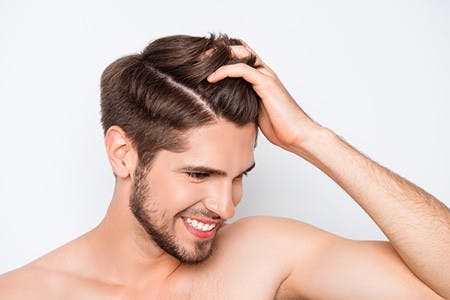Nutrafol had a chat with Colin Sanders, a cosmetics tester and consultant with over 30 years’ experience in the topical pharmaceutical industry. Colin has come across a wide variety of products during his career. So we asked him the following: Are the majority of haircare products are safe to use? Is it possible that a harmful gel or wax could slip through the nets of the testers? And, can you go bald if you use them?
Are Your Hair Products Making You Go Bald? We Asked Experts: Part II
6 Min Read

Get hair, health, and science news delivered right to your inbox.
“It is very unlikely indeed,” says Sanders. “Affecting hair growth positively or negatively is a tough challenge. And even hard line pharmaceuticals like Minoxidil [an anti-hair loss drug] don’t have dramatic effects.”
Hair products and the damage on your hair
Since the early nineties, all cosmetic products have had to pass a written assessment by a suitably-qualified person. So it would be quite unlikely for something harmful to slip through. The only way a product currently available on the market could damage your hair is if you used a dye to continually recolor your hair. This may make you more likely to develop an allergic reaction to the chemicals used in them and damage your scalp.
“But, even then,” Sanders stresses, “the risk would still be pretty low. I’m a chemist and I don’t find chemicals particularly scary in general. Hair products represent a pretty low level of exposure to chemicals compared to other things that we eat and breathe.”
There are other factors that determine if you are going to suffer from hair loss. And whilst gels, waxes and hairsprays may not be helping the issue, they certainly aren’t causing it. So what should men be concerned about if they want to hold onto a full head of hair? Nutrafol asked Vanessa Bailey, a consultant trichologist at The Hair Clinic in Westminster.
The male balding process
“The male balding process is determined by factors such as genes, hormones, poor health and poor diets,” explains Vanessa Bailey. “However, there is a chance that dermatitis could develop if irritants are routinely massaged into the scalp”, she continues. And this can be detrimental to hair growth. “That is why you should just apply these products to the hair, never the scalp,” she went on to tell us.
Gels and hairsprays are the worst offenders, Bailey points out. But there is still no need to completely steer away from these products. Simply look for lower-alcohol products and adhere to regular hair shampooing. And it helps to choose a supplement that is designed to provide you with the building blocks for healthy hair. Your best first line of defense, as always, is to consult with a medical professional. Ideally, one who specializes in hair issues, like a dermatologist, a hair restoration specialist or a trichologist.

How often should a man wash the product out of his hair to avoid going bald?
Ideally, hair products should be washed out after twenty four hours, advises Bailey. “I always recommend that you should shampoo daily. If these products are left in longer than that, a build-up on the scalp is likely. And this build-up may cause an itchy, inflamed and scaly scalp.”
“I once came across a patient who ruined his hair with excessive use of hair gel. He applied the product on his hair every day. And he did not shampoo his hair for a period of three weeks. The lengths were so damaged by the time he finally shampooed his hair, that they needed to be cut off,” she continues. “However, his was only cosmetic damage, of course – and didn’t mean that he became more susceptible to baldness.”